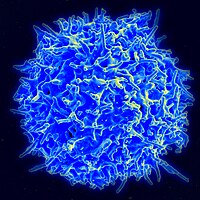
Photo from wikipedia
Emerging evidence suggests that microbiome-host crosstalk regulates intestinal immune activity and predisposition to inflammatory bowel disease (IBD). NF-κB is a master regulator of immune function and a validated target for… Click to show full abstract
Emerging evidence suggests that microbiome-host crosstalk regulates intestinal immune activity and predisposition to inflammatory bowel disease (IBD). NF-κB is a master regulator of immune function and a validated target for the treatment of IBD. Here, we identify five Clostridium strains that suppress immune-mediated NF-κB activation in epithelial cell lines, PBMCs, and gut epithelial organoids from healthy human subjects and patients with IBD. Cell-free culture supernatant from Clostridium bolteae AHG0001 strain, but not the reference C. bolteae BAA-613 strain, suppresses inflammatory responses and endoplasmic reticulum stress in gut epithelial organoids derived from Winnie mice. The in vivo responses to Clostridium bolteae AHG0001 and BAA-613 mirror the in vitro activity. Thus, using our in vitro screening of bacteria capable of suppressing NF-κB in the context of IBD and using an ex vivo organoid-based approach, we identify a strain capable of alleviating colitis in a relevant pre-clinical animal model of IBD.
Journal Title: Cell reports
Year Published: 2022
Link to full text (if available)
Share on Social Media: Sign Up to like & get
recommendations!